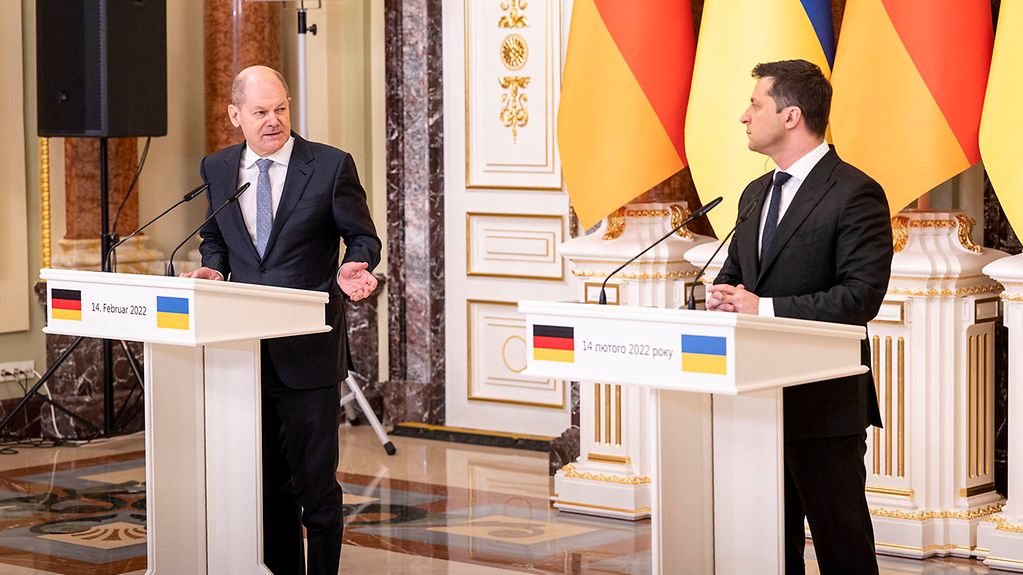Federal Chancellor Scholz in Kyiv
On his inaugural visit to Kyiv, Federal Chancellor Scholz reiterated that Germany stands side by side with Ukraine. He stressed that no one should doubt the resolve of the Western allies. In the event of military aggression against Ukraine, joint action would be taken, he said – “and it will comprise very far-reaching measures.”

Federal Chancellor Scholz with President Zelensky: Germany supports Ukraine on its European path.
Photo: Bundesregierung/Denzel
Federal Chancellor Olaf Scholz travelled to Kyiv not just for his inaugural visit but also as part of intense diplomatic efforts to ease the worrying situation in and around Ukraine. “Germany stands side by side with you,” stressed Federal Chancellor Scholz in a joint press conference after the meeting with Ukrainian President Volodymyr Zelensky on Monday.
Germany actively supports Ukraine
Germany has been cooperating with Ukraine for many years in a wide range of areas. Economic relations between the two countries are very close. What is more, no other country in the world has provided the same high level of financial support for Ukraine as Germany over the past eight years. “With contributions amounting to more than two billion US dollars, we have made the Ukrainian economy more resilient and independent in the face of foreign influence,” said Scholz.
He added: “I can assure you that we will continue to provide this support with the same determination. This is why I am pleased to announce today the accelerated disbursement of 150 million euros from the current loan, as well as a new untied financial loan of another 150 million euros.”
Engagement under the Normandy format
Germany is also very committed to finding a diplomatic solution in this difficult situation. Together with France, Germany has intensified its efforts under the so-called Normandy format to this end in recent weeks.
Federal Chancellor Scholz and President Zelensky agreed that the Normandy format makes a crucial contribution to the dialogue process with Russia, alongside talks between the USA and Russia, in the NATO-Russia Council and in the OSCE. Federal Chancellor Scholz said: “It is unquestionably a difficult process, but I strongly believe that this effort is worthwhile.” In this connection, he welcomed Ukraine’s willingness to submit draft laws on special status, constitutional amendments and electoral law in the near future so as to advance and substantiate the talks within the framework of the Minsk agreements.
In addition to all the other existing formats, direct talks with Kyiv and Moscow were important too, said Scholz. “This is another key reason for my trip,” said the Federal Chancellor.
Normandy format and Minsk agreements
There has been an armed conflict in eastern Ukraine since 2014. Under the so-called Normandy format, Russia, Ukraine, Germany and France agreed on a roadmap for resolving the conflict in 2014 and 2015 based on the Minsk agreements. Together with France, the Federal Government is very committed to breathing new life into this format.
Fundamental Helsinki principles not up for discussion
The talks in Kyiv addressed not just Russian troop movements but, in particular, the question of how to deal with Russian demands for security guarantees. Here, the Federal Chancellor provided clarification with regard to Ukraine potentially joining NATO: “The fundamental Helsinki principles, including the principle of free choice of alliance – which includes NATO – are not up for discussion.” At the same time, the Federal Chancellor added, the question of memberships and alliances was not even on the agenda at the present time.
In this connection, he again pointed out that it was up to Russia to de-escalate the situation and ensure that Russian troops withdraw. The Federal Chancellor stressed: “Russia’s military activities on the Ukrainian border are incomprehensible to us.”
Sovereignty and territorial integrity of Ukraine
In view of this, Federal Chancellor Scholz emphasised: “The sovereignty and territorial integrity of Ukraine are non-negotiable for Germany and our partners.” From Germany’s point of view, he said, there was no question that further military aggression against Ukraine would have serious political, economic and geostrategic consequences.
During his visit to Ukraine, Federal Chancellor Scholz laid a wreath at the Tomb of the Unknown Soldier. The Federal Chancellor was also particularly keen to visit the monument to the “Heavenly Hundred” to pay tribute to the courageous Maidan demonstrators who had sacrificed their lives for their commitment to a free, democratic and sovereign Ukraine.
“My country is impressed by the democracy movement in your country and supports you on the European path that Ukraine has pursued since 2014,” he said.
Dialogue with Russia on European security issues
Germany was prepared to engage in serious dialogue with Russia on issues of European security, said the Federal Chancellor. NATO and the USA had made concrete proposals to Russia, said Scholz. “We now expect Russia to respond,” said the Federal Chancellor, explaining the current state of affairs.
Germany also considers talks within the framework of the OSCE to be useful. Scholz again called upon Russia to “make the most of all existing offers of dialogue. Here we will always advocate close coordination with Ukraine.”
Travel advice issued by the Federal Foreign Office
In view of the existing tensions between Russia and Ukraine, the Federal Foreign Office currently warns against travelling to Ukraine. For this reason, the Federal Foreign Office issued an appeal on 12 February to all German citizens in Ukraine to leave the country swiftly if there was no urgent reason for them to be there.
Eastern Ukraine
There have been armed clashes in eastern Ukraine (Donetsk and Luhansk administrative districts) since spring 2014. Parts of these administrative districts are currently not controlled by the Ukrainian government but by separatist forces. Fighting between Ukrainian armed forces and the insurgent armed forces takes place almost daily.